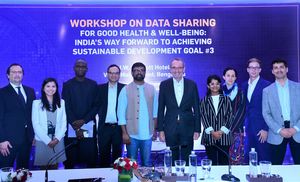The Max Planck Institute for Innovation and Competition has contributed significantly to the fast evolving policy framework in EU for the regulation of its digital economy. Most recently an in-depth analysis of the provisions of the proposed Data Act was published as a position statement. However, since the issues pertaining to the digital economy are of a global nature, the Institute is also looking at the developments outside the EU. Against this backdrop, a team of researchers led by Prof. Dr. Josef Drexl is working on a project titled Regulation of the Data Economy in Emerging Economies. The project has a specific focus on studying the approaches of emerging economies for leveraging data sharing in order to achieve the Sustainable Development Goals and is being developed in collaboration with international partners from Brazil, India and Senegal. The said partners are Mackenzie University, São Paulo, National Law School of India University, Bengaluru, BML Munjal University, Haryana, and Université Virtuelle du Senegal, Dakar.
To identify the state of play of each country regarding data sharing in the context of the UN Sustainable Development Goals (SDGs), the research starts by assessing current initiatives from both private and public entities, the existing legal framework and the policy debate regarding data sharing. Accordingly, on-site workshops were planned to be held in each country to contextualise the research in the socio-economic realities of these emerging economies. The first in the series was titled “Workshop on Data Sharing and Sustainable Development in Emerging Economies - Senegal” and held in Dakar on 16 and 17 March 2022. Its focus was agriculture and financial inclusion. This was followed by a workshop organised in Bengaluru on 8 and 9 September titled “Data Sharing for Good Health & Well-Being: India’s Way Forward to Achieving Sustainable Development Goal 3”.
The recently concluded workshop in Bengaluru brought together a wide range of stakeholders in India from pioneering industry representatives in the health sector (NIRAMAI Health Analytix, Saathealth, DRiefcase, Ambee); industry associations like NASSCOM; private initiatives like Swasth Alliance and iSPIRT, public bodies such as NITI Aayog, independent researchers and research institutions in the area of health, members of civil society as well as academic scholars from policy and legal disciplines.
One key takeaway from the Bengaluru workshop was that there is enormous innovation happening in diverse areas with the utilisation of data, both personal and non-personal, in the direction of achieving SDG #3. It was also observed that India benefits from its experience in setting up digital public infrastructure dating back to the development of its Unified Payment Interface in 2016. This departs from the approach in Senegal where the infrastructural backbone for data sharing is still missing. While the take-up of these initiatives in the health sector has been encouraging in India, a regulatory framework governing this largely technological solution to data sharing in health seems to be lacking. The absence of a comprehensive data protection regime in India was a recurring theme.
In the coming months, country-specific reports are awaited from each workshop. These scientific reports will analyse the variety of approaches in these emerging economies and inform the formulation of commonly applicable recommendations. Such recommendations may then be utilised to tailor specific data-sharing policies and assist in attaining SDGs.
The next workshop is to be held in São Paulo on 15th and 16th December, 2022 at the Mackenzie University with a focus on climate action (SDG #13): Data Sharing & Climate Action in Brazil

